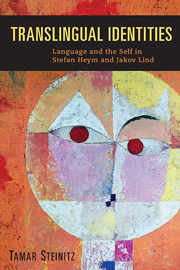Book contents
3 - The Writer and His Languages
Published online by Cambridge University Press: 05 October 2013
Summary
The move from one language—and from one culture—to another features distinctly in the works discussed in the previous chapters. Lind represents translingualism in his autobiography optimistically, as a possible solution to a crisis of identity, whereas Heym reveals in The Crusaders the tensions of identification that consume and ultimately destroy his translingual character, Walter Bing. Although translingualism itself is not a theme of the authors' later works, I will contend that it nevertheless underlies and shapes these works and the figure of the writer that emerges from them—both in the text and as the identity constructed by the authors as a means of self-definition.
In this chapter, I focus on two satirical and allegorical works that feature a writer as the narrator-protagonist: Lind's Travels to the Enu and Heym's The King David Report. Language is a key theme of Lind's novel, and becomes, as in his autobiographical works, an internalized battle-ground. Heym's novel, a subversive retelling of the biblical story of the life of King David, was composed in English and translated by Heym into German. Using drafts to trace the role of self-translation in the composition of this novel, I will argue that through the doubling of perspective that this process entails and through the reference to a single, universal origin—the Bible—this bilingual text positions its author as mediator between languages and cultures.
- Type
- Chapter
- Information
- Translingual IdentitiesLanguage and the Self in Stefan Heym and Jakov Lind, pp. 96 - 135Publisher: Boydell & BrewerPrint publication year: 2013



